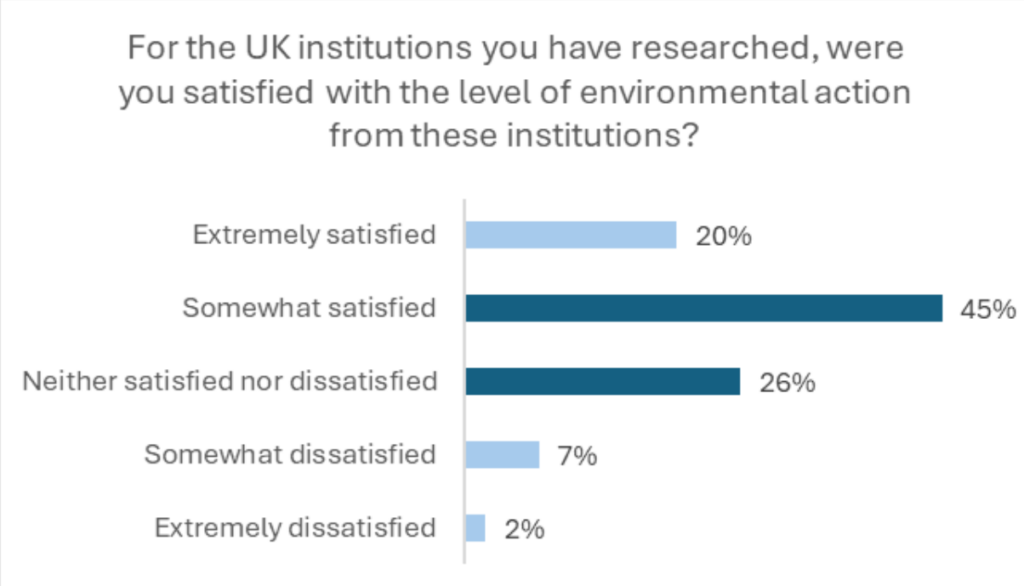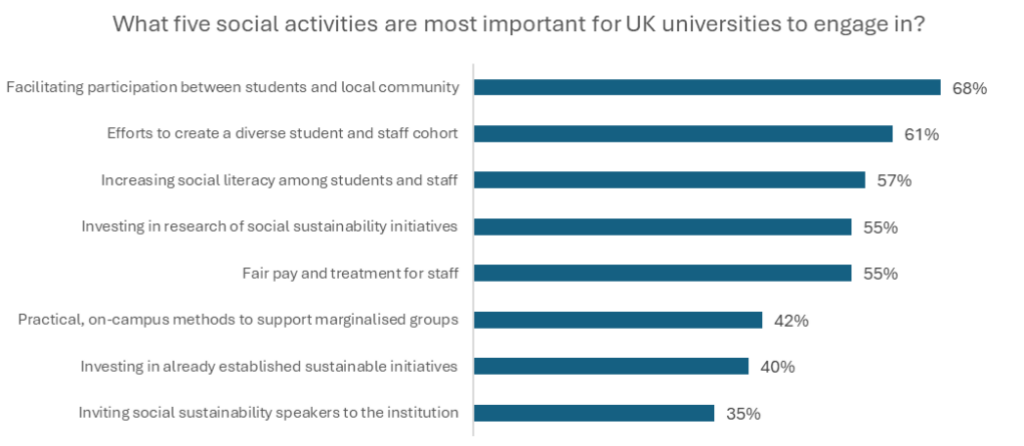
Written by Leigh Kamolins, QS Director of Analytics and Evaluation. Originally published by the Higher Education Policy Institute.
What matters to students continues to evolve as the world around them changes. Through QS data and analytics – including the International Student Survey which collates the perspectives and motivations of over 115,000 international students annually – it is becoming clear that a greater awareness of environmental and social sustainability issues is leading to growing expectations on universities to act.
Impact and influence on sustainability is emerging as a key factor in student decision-making. In 2022, 79% of students felt that it was very important that universities reduce their environmental impact (QS Student Pulse Survey). Now, over half of students interested in studying in the UK are actively researching their sustainability strategies and efforts as part of their decision-making (QS International Student Survey 2023). Though students are not fully satisfied with university action.

Student expectations are growing and through research, teaching, cultural and operational initiatives, higher education has the power to lead the call for change on sustainability. It’s increasingly important in today’s highly competitive recruitment landscape that universities make their sustainability credentials and progress clear to prospective students.
Though with students’ watchful eyes on how institutions align with world challenges, universities must be ready to adapt when it comes to delivering active initiatives both on campus, in research, and within community. Students want to see universities leading in social progress as well as environmental sustainability, seeing that the two are often intertwined.
In fact, over 80% of prospective students consider a university’s track record on social issues when applying to university according to the latest QS Student Pulse Survey. Students specifically want to see universities encouraging and facilitating participation between students and the local community, as well as efforts to create a diverse student and staff cohort, fair pay and treatment for university employees and practical methods to support marginalised groups on campus.

The desire from students for universities to act is being heard. From the inaugural launch of the QS World University Rankings: Sustainability in 2023, the number of participating institutions more than doubled by the next edition in December 2024.
Interest in the world’s most sustainable institutions is growing. Page views for the QS Sustainability Rankings in the first 48 hours of launch doubled from 2023 to 2024. The US, UK and China are the most represented countries in the QS World University Rankings: Sustainability 2024.
Institutions that demonstrate their commitment to sustainability position themselves as an attractive choice for international students seeking to align their educational pursuits with values of environmental and ethical stewardship.
Here are four key areas that universities should harness for maximum impact:
Leverage student insights
Whether reshaping the curriculum, designing community projects or embedding sustainability goals and achievements within student recruitment strategies, it must start with in-depth and up-to-date student insights. The more knowledge gleamed about student perceptions, motivations and expectations, the more authentic and aligned institutions’ can be in reflecting the values and priorities of the international student body.
Showcase your sustainability credentials and ensure they are easy to find
It’s vital to differentiate your institution from the global competition and attract quality, values-driven students who want to make a difference. Shout about your achievements and developments, build sustainability into prospective student marketing plans, and provide students with clear and readily available information that empowers them to make informed choices more easily. Showcase the ways your institution is different to other institutions and what makes you unique in the sustainability space.
Connect applicants with current students
Over half of students interested in the UK find it useful to connect with existing international students when making decisions about their studies (QS International Student Survey 2023). By enabling applicants to see why sustainably-minded students chose your institution and what it’s like studying at a sustainable institution, universities can build trust and demonstrate a tangible commitment to environmental and social responsibility.
Engage students in community projects
68% of students think it’s important that UK universities encourage and facilitate student sustainability projects with the local community (QS International Student Survey 2023). Help students to understand how they can get involved with environmental and socially sustainable projects and initiatives with your university.
As climate and social justice issues increase, student expectations on universities are set to grow. The impact of university sustainability on student decision-making will become more prominent in the coming years so it’s a crucial time for institutions to act.



